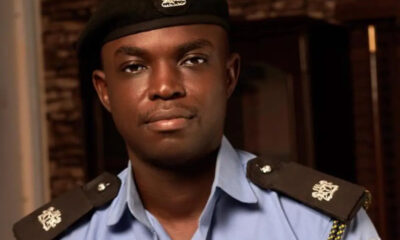metro
FG Calls on Western Allies to Declare Bandits, Boko Haram, IPOB as Terrorists

The federal government yesterday said that it was continuing to put pressure on its western allies to “proscribe” bandits, Boko Haram and the Indigenous People of Biafra (IPOB) as terrorists.
The government said that doing so would severely reduce the funding for the groups, noting that it was doing all within its powers to ensure that a stop is put to the killings throughout the country.
Senior Special Assistant to President Muhammadu Buhari on Media and Publicity, Mr Garba Shehu, made the assertion yesterday in reaction to an editorial by Daily Trust newspaper titled: “Life Has Lost Its Value Under Buhari’s Nigeria.”
While the federal government had earlier designated both Boko Haram and IPOB as terrorist organisations, last month, it finally got a Federal High Court in Abuja presided over by Justice Taiwo Taiwo to add bandits to the list.
The presidential spokesman stated that aside proscribing the three groups, its friends in the West should partner Nigeria in areas of trade and investment to deplete the reservoir of unemployed Nigerians where the various violent groups recruit their members from.
According to the presidency, the economic instability that the Covid-19 pandemic has wreaked has further proven an effective recruitment tool for bandits and terrorists across the nation in particular and the African continent as a whole.
“Even as the West continues to extricate itself from Africa militarily, we are lobbying our Western allies aggressively for partnership, investment and support in other areas, such as proscribing Boko Haram, bandits and IPOB as terrorist groups.This would severely dent their funding
READ ALSO:
- Panic grips Zamfara communities as gunmen demand over N1m levy
- ‘Taxing carbonated drinks will reduce rate of diseases’
- I spent 28 years on death row for nothing — Onwuche, 68-year-old cook
“(We are asking) them for investment in trade and infrastructure, to help lessen economic instability; and to help with technical assistance, advanced weaponry, intelligence and ordinance,” the presidency stressed.
Shehu explained that although this will likely be small comfort to the families and loved ones of those already lost, ridding the country of avoidable deaths is a battle the federal government is fighting without let up.
Stating that the growing instability and violence in the north of Nigeria and elsewhere were unacceptable, the federal government pointed out that no one, not least the presidency underestimates the seriousness of the situation.
“Every day, the president holds the victims and their families in his thoughts and prayers. Above all, he wishes to reassure them – and all Nigerians – that tackling the scourge of banditry and terrorism remains this government’s first priority,” the government added.
However, Shehu argued that in respect of violence and terrorism, Nigeria is not unique, arguing that violence and terror have risen steadily across the entire African continent over the last decade.
He maintained that the “Economist magazine” in a recent publication wrote about “The Next Afghanistan,” warning the global community of the horrifying security in its neighbourhood, citing specifically the states of Mali, Burkina Faso and Niger.
Noting that the presidency understood the frustrations of the newspaper and Nigeria’s northern communities about the ongoing challenges of security, Shehu noted that the Buhari administration is no less worried by the situation.
The Buhari government argued that it is only fair to say that Nigeria’s persistent and continued efforts to suppress the instability have seen results, with terror group Boko Haram, among others “reduced to a shell of its former self”
“Yet now we Nigerians face a new threat: the worst global health crisis in living memory. Even Nigeria that proudly holds the mantle of Africa’s largest economy is not immune from the debilitating economic impact of COVID-19.
“ The economic instability that the pandemic has wreaked has proven an effective recruitment tool for bandits and terrorists across the continent.
“Indeed, the Daily Trust has correctly identified the source of the violence as ‘an amalgam of many complex issues’ such as poverty and unemployment. It is equally right to note that, in tackling the violence, ‘force alone will not be enough.
“It is quite wrong, however, to suggest the problem of insecurity is intractable, and more wrong still to claim apathy on the part of the government,” the presidency argued.
Continuing on what the federal government was doing to ameliorate the situation, Shehu stated that the Nigerian military efforts have not let up, but admitted that it is true that in the face of today’s growing number of threats from Boko Haram, bandits, kidnappers and IPOB to run of the mill bandits, the forces were stretched increasingly thin.
“Second, alongside military force, this government is seeking to address the violence at its economic source. Massive infrastructure projects like the coastal rail and new train from the southern coast through the north-east to our neighbour Niger aim to expand employment and opportunity across the country, bringing hope to our more remote and poorer regions where bandits and terrorists thrive,” he said.
The spokesman maintained that the Daily Trust’s suggestion that the president exchanges violence for the support he got electorally was “beneath a publication that claims any kind of political neutrality or integrity.”
According to the presidency, the focus as Nigerians must be on coming together and ending the violence pervading the country.
“As President Buhari wrote recently of the terrorists in UK paper ‘The Financial Times’: “We will defeat them, one highway, one rail link – and one job – at a time,” the statement added.
Thisday
metro
Tinubu’s ex-adviser writes him to step aside in 2027

Tinubu’s ex-adviser writes him to step aside in 2027
A former Special Adviser on Political Matters in the Office of the Vice President, Hakeem Baba Ahmed, has written President Bola Tinubu to ask him to “step aside (in 2027) not for your opponents but for a generation of Nigerians who can carry the nation forward with fresh energy and ideas”.
The letter: Your Excellency, Mr. President, I had hoped I would have the opportunity to meet you one-on-one for the first time since you approved my appointment as Special Adviser on Political Matters in the Office of the Vice President about 18 months ago. It would have afforded me an excellent opportunity to offer what might have been the only significant advice I could give you directly in return for the salary you paid me. I had also hoped that an audience with you would provide the chance to explain why I insist on resigning, despite efforts to dissuade me by the Vice President, some Ministers, key officials in your administration, and a host of people I hold in the highest esteem. Well, all that is now history.
Still, please allow me to thank you for approving my appointment and for the privilege of serving my country once again as a public officer. To be honest, for someone at 70 who did not campaign for you, is not a member of your party, and who had gained some reputation for sustained criticism of your APC predecessor’s eight years of deeply damaging governance, your approval that I should come on board gave the impression of a willingness to tolerate inclusiveness and diversity, as well as some regard for merit. I am particularly grateful to the Vice President, who went to great lengths to convince me that staying in place was a better option than resigning.
I must be honest in saying I had many misgivings about accepting the invitation in the first place. Your “Emi Lokan” mantra suggested to me a worrying desire to lead, driven mainly by the urge to satisfy personal ambition. I felt that after the Buhari misadventure—for which the country continues to pay a steep price—the last thing we needed was another leader driven purely by a personal quest for power. Many well-meaning people advised me that I would not fit into your administration for various reasons, the most common being that you might end up as Buhari 2.0—or worse—and I would shift from being a vocal critic to an active or silent collaborator.
READ ALSO:
- Oluwo replies Olubadan over Osun/Oyo boundary claim
- Barrister raised me but didn’t learn Fuji music from him – Wasiu Ayinde
- Police bust human trafficking ring in Oyo, 84 victims rescued
It was tempting to sit it out and wait—either to critique you if you failed to provide the leadership the nation needs or commend you if you succeeded in turning the country around. In the end, I thought it better to help put out the fire than curse those who lit it. I joined your administration as an Adviser with my eyes wide open, at the cost of valuable relationships and under intense hostility from social media ‘politicians’ who assume every political appointee is in it for personal gain (read: lots of money, most of it stolen).
Vision
My long career in the federal public service taught me that the Office of the Presidency has a long-standing tradition of treating the Vice President’s office at best as a constitutional liability, and at worst, as a suspicious appendage constantly scheming to take the number one position. When you pushed the nation into the deep end with your inaugural announcement on subsidy removal, a few of us with experience in policy design and public administration knew the country would need the best hands to manage massive change and transition.
You inherited a badly damaged economy and a severely stressed population. Without a clear and sustained vision, and failing to translate the May 29 momentum into consistent leadership, your administration was bound to face turbulence. The idea of another four or eight years of poor governance after Buhari’s era was too alarming to contemplate. You needed some basic elements to succeed.
First, you needed a clear vision of your goals and the challenges you had to overcome. Unfortunately, it seemed you were too busy chasing political dominance, relying on your old Lagos circle to supplement a vision that was lacking. Your Renewed Hope Agenda is not a vision—it is a set of campaign promises, not a structured governance strategy worthy of your experience, however dated. You needed to appoint men and women who shared a compelling vision—not merely loyal party members and political jobbers. Your initial appointments reflected more politics than quality. Though there was some improvement later, the effort was tepid. As things stand, more than half your cabinet has no business managing an administration tasked with improving security, livelihoods, or public trust.
You needed to embody and uphold personal integrity, good health, and strong commitment to the demands of your office—hard work, fairness, and humility. Yet your closed-door style of leadership, your apparent indifference to complaints of ethnic bias in appointments, and the perception that you frequently run the country from abroad while attending to personal matters, have created the image of an isolated leader heading an insular administration.
READ ALSO:
- Lagos taskforce arrests 52 suspects in Island clean-up operation
- JAMB candidates die in Oyo road crash
- Missing student found safe after disappearing en route to JAMB exam
Your inner and secondary circles do not reflect the discipline or inspiration necessary to transform Nigeria. Pandering to political interests at the expense of good governance has deprived you of the tools to make a greater impact. You needed to act as a democrat in a federal system—something even the best global leaders struggle with. It appears your experience in governing Lagos, playing the kingmaker, and resisting premature power grabs did not prepare you for the complex demands of national leadership—balancing self-interest with the challenges of inclusive governance and statesmanship.
Between you and Buhari
You needed to create a balance between the past you wanted to reform and the future you hoped to shape. Instead, you’ve created a situation where citizens debate whether life under you is worse than under Buhari, or better only in economic jargon that doesn’t reflect their suffering. You needed to build a team driven by urgency, purpose, and a deep understanding of the scale of your mission—not one content with the routine and mediocrity inherited from the past. That team never materialised.
You needed a strong engagement strategy—one capable of building national consensus or at least neutralising hostility. Instead, you’ve appointed a crowd of spokespersons who often confuse rather than clarify your policies. You’ve ignored legitimate dissent, choosing instead to engineer a pliant legislature, thereby robbing the nation of robust democratic discourse. Your record on security and institutional reform is unimpressive.
These are harsh truths, Mr. President—but few will tell you even their diluted versions. Now your administration is being pushed toward prioritising the 2027 elections over governance. But improving governance, revisiting priorities, refining policies, instilling fiscal discipline, addressing grievances, combating insecurity and corruption, and fostering national unity should be your focus.
Two years is a long time—you can still achieve much. But if you shift attention now to electoral ambitions, you risk losing both governance momentum and public goodwill. If you win again without reforming your style and strategy, you may spend four more years preserving failure. If you lose, your legacy could be wiped out in an instant.
You hold what your opposition lacks: the power to reduce the harshness of life for the average Nigerian. Use it well. Watch 2027, yes—but don’t become consumed by it. The North is drifting from your leadership under the weight of economic hardship, insecurity, and alienation. The East remains politically disengaged, while the South-South is fragmented. The South West has been lukewarm, and its privileged position may become a burden. The North East is deeply wounded and can no longer be taken for granted.
Step aside
Mr. President, I urge you to reflect deeply on the legacy you want to leave and how history will remember you. Insisting on running for a second term could be a grave mistake. Your name is already etched in Nigeria’s history. Use the time until 2027 to shape your legacy—not just extend your tenure.
Step aside—not for your opponents, but for a new generation of Nigerians who can carry the nation forward with fresh energy and ideas. Our generation has done its time. It would be a masterstroke if you and your party yielded the field to new voices and new leadership. That way, you could catalyse a peaceful, historic transformation and inspire a new political culture rooted in merit, unity, and progress.
Mr. President, these and a few more thoughts are what I would have offered you in person. You do not have the reputation of being overly conservative. I hope you still possess the fire to challenge the status quo. Perhaps, this is the role destiny has prepared for you.
I offer this advice with sincerity and hope—believing that one leader can change the course of a nation. That leader could be you. Many who’ve worked with you say you mean well for Nigeria. That’s why I ask, respectfully and firmly: Mr. President, please do not run again in 2027.
Tinubu’s ex-adviser writes him to step aside in 2027
metro
Oluwo replies Olubadan over Osun/Oyo boundary claim

Oluwo replies Olubadan over Osun/Oyo boundary claim
The Oluwo of Iwoland, Oba Abdulrosheed Adewale, has faulted the purported claim by the palace of Olubadan, Oba Akinloye Olakulehin, that Odo Oba is the boundary between Ibadan in Oyo State and Iwo in Osun State.
Oluwo described the claim as false, incoherent, blatant distortion of facts and a deliberate plot to heighten the tension of the original land owners and cause chaos in the affected areas.
According to Oluwo, no one has the right to make such a pronouncement when the matter is before the National Boundary Commission (NBC), saying that such a statement is synonymous with contempt of the Federal Government and a sabotage on the effort of the AIG Zone XI, Emuobo Fred Ekokotu, who have intervened and invited the two parties to respect the status quo.
He advised the palace of Olubadan to respect the government represented by the police and the NBC and restrain from comments likely to fuel further destruction in the area.
Oluwo affirmed Papa Ebira as the established boundary of Iwo with a map officially demarcated in 1991 when Osun was created out of the old Oyo State.
READ ALSO:
- Barrister raised me but didn’t learn Fuji music from him – Wasiu Ayinde
- Police bust human trafficking ring in Oyo, 84 victims rescued
- Lagos taskforce arrests 52 suspects in Island clean-up operation
He revealed the affected villages such as Paku, Ogunajo, Oloola Molamu, Papa, Tifede, Ejemu are all ancestral villages of Iwo with Osun State Government facilities and polling units presence.
A statement released by Oluwo and made available to newsmen through his press secretary, Alli Ibraheem, on yesterday reads: “I read the statement credited to Olubadan palace, Oba Akinloye Olakulehin, that Oba River is the boundary of Iwo with Ibadan, with dismay, coming at a critical moment when the AIG Zone XI, Emuobo Fred Ekokotu, is making a concerted efforts to restore peace in the affected villages. Just two days ago, he invited the two parties to his office and tentatively directed the duo to stay off the affected villages.
“As a peace-loving father to the nation, I calmed the people of these villages. I encouraged them to respect the decision of the AIG and await the report of the National Boundary Commission. Any other message is an affront on the NBC and the police representing the government in resolving the dispute permanently.
“For record purposes, Papa Ebira is the boundary of Iwo with Ibadan, well demarcated in the map since 1991 when Osun was carved out of Oyo State. The disputed villages are ancestral properties of Iwo even before the creation of Ibadan. And there was never a time in history when Iwo and Ibadan fought and won part of each other’s land.
“Leaders of most of the warlords who fought for Ibadan hailed from Iwo. Balogun Ali Iwo, Ogun mola, Oderinlo and a few others migrated from Iwo to Ibadan.
“The appropriate time has come to permanently resolve the land dispute. Let’s conduct ourselves and encourage our subjects to be law abiding. No one is greater than the government. We should allow the government to do their job. Peace is priceless and should be promoted,” Oluwo said.
Oluwo replies Olubadan over Osun/Oyo boundary claim
metro
How Access Bank staff secretly filmed 400 colleagues naked in office

How Access Bank staff secretly filmed 400 colleagues naked in office
A former quality assurance specialist at Access Bank’s contact centre in Oniru, Lagos, (name withheld), has found himself at the centre of a disturbing scandal involving the secret filming of hundreds of his colleagues.
According to a report by FIJ, the suspect allegedly secretly recorded about 400 colleagues, particularly women, naked inside the office restrooms.
Sources told FIJ that he was apprehended inside the female restroom around 1:30 a.m. on Wednesday.
Although Access Bank subsequently called for his arrest and a raid was conducted at his residence, he was later released from custody.
Some of the affected staff, whose nude images were found among the videos, have voiced concerns about their chances of getting justice, especially since the suspect has been dismissed and is no longer detained by the authorities.
Questions linger over how the suspect was able to carry out such acts undetected.
READ ALSO:
- Police bust human trafficking ring in Oyo, 84 victims rescued
- Lagos taskforce arrests 52 suspects in Island clean-up operation
- JAMB candidates die in Oyo road crash
According to FIJ, the Access Bank contact centre operates a shift system, meaning some employees often spend the night at the office, where they also bathe and freshen up.
“He snuck into the ladies restroom. I believe he wanted to hide his camera as usual, so he noticed ladies coming and hid in one of the toilets beside the bathroom,” a source told the online newspaper.
“Mind you, the men’s restroom is not too close for him to have mistakenly entered the one for women.
“He was found when a lady taking her bath noticed a phone recording her from the toilet cubicle, which is directly by the side of the bathroom. She noticed someone closed the water closet seat, and was making a video. She just saw the camera by chance.”
Upon raising the alarm, more staff members gathered, demanding that the person inside open the door. Eventually, he emerged.
“That was when people saw it was Stephen. He said he didn’t know how he got to the ladies’ toilet, but couldn’t explain the part of him making videos,” a witness recounted.
Later that day, after more footage showing both male and female colleagues naked in the restroom was discovered on his devices, he was taken into custody. A further search of his home uncovered over 400 such videos stored on his laptop.
In an even more unsettling twist, reports suggest that Ijezie may have been profiting from the exploitation.
Despite these revelations, those who previously worked with Ijezie described him as an unlikely perpetrator.
“He was so cool and would always ask after people. That aside, he was an exceptional agent. No one would ever have thought this would come from him,” a former colleague shared.
How Access Bank staff secretly filmed 400 colleagues naked in office
-

 metro16 hours ago
metro16 hours agoTruck falls from Lagos bridge on two buses
-

 metro2 days ago
metro2 days agoOmokri : How Tinubu’s political mastery started with Abiola, says El-Rufai, Obi’s forces can’t stop him
-

 Education2 days ago
Education2 days agoJAMB officials seize candidates’ hijab at Caleb varsity, Muslim students kick
-

 metro11 hours ago
metro11 hours agoHow Access Bank staff secretly filmed 400 colleagues naked in office
-

 International2 days ago
International2 days agoUS releases 41 countries granted 90-day entry without visas (full list)
-

 metro2 days ago
metro2 days agoGroom cancels wedding, marries another lady same date, venue
-

 metro1 day ago
metro1 day agoEFCC declares four persons wanted over CBEX scam
-

 Education1 day ago
Education1 day agoJAMB delists four centres, arrests 27 impersonators in ongoing UTME













